Welcome to the week. Here are the most notable news items our community has come across in the past seven days…
Stunning finish: With three of four men in the winning break from the same team, what happened at the Dwars door Vlaanderen race was unbelievable. (Cycling Weekly)
Police chases kill innocent people: A large investigation by a media organization found that the majority of people killed as a result of police chases are innocent bystanders. (SF Chronicle)
USB-C?!: Imagine charging your new e-bike with the same cable you use to charge your headlight. That’s the promise of Ampler Bikes, a company that allows riders to charge with a USB-C cable. (Electrek)
An abundance of caution: We’ve already seen how the “abundance mindset” has influenced local elected officials who are eager to build the I-5 Rose Quarter project. That’s the type of thinking that David Zipper cautions against in his piece of how abundance principles apply to transportation. (Bloomberg)
Love (riding with) yourself: I appreciate this reflection on riding alone (versus ride with a group) because I share many of the same feelings. Or to put it in modern parlance, I feel seen. (Cycling Weekly)
Tern and tariffs: There’s massive uncertainty around what impact Trump’s tariffs will have on the bike industry, but this story about bike maker Tern and a possible $1 million tariff payment illustrates the chaos they’ve already caused. (Bicycle Retailer)
Overpolicing: A Florida man working as a police officer rammed his patrol car into a boy who was riding his bike in the street. The police agency said the boys were an organized group doing unsafe stunts on public roads. (NBC South Florida)
What women want: A British study found that women are more likely then men to ride less (or not ride at all) because of fears that drivers will treat them poorly. (Guardian)
Thanks to everyone who sent in links this week. The Monday Roundup is a community effort, so please feel free to send us any great stories you come across.



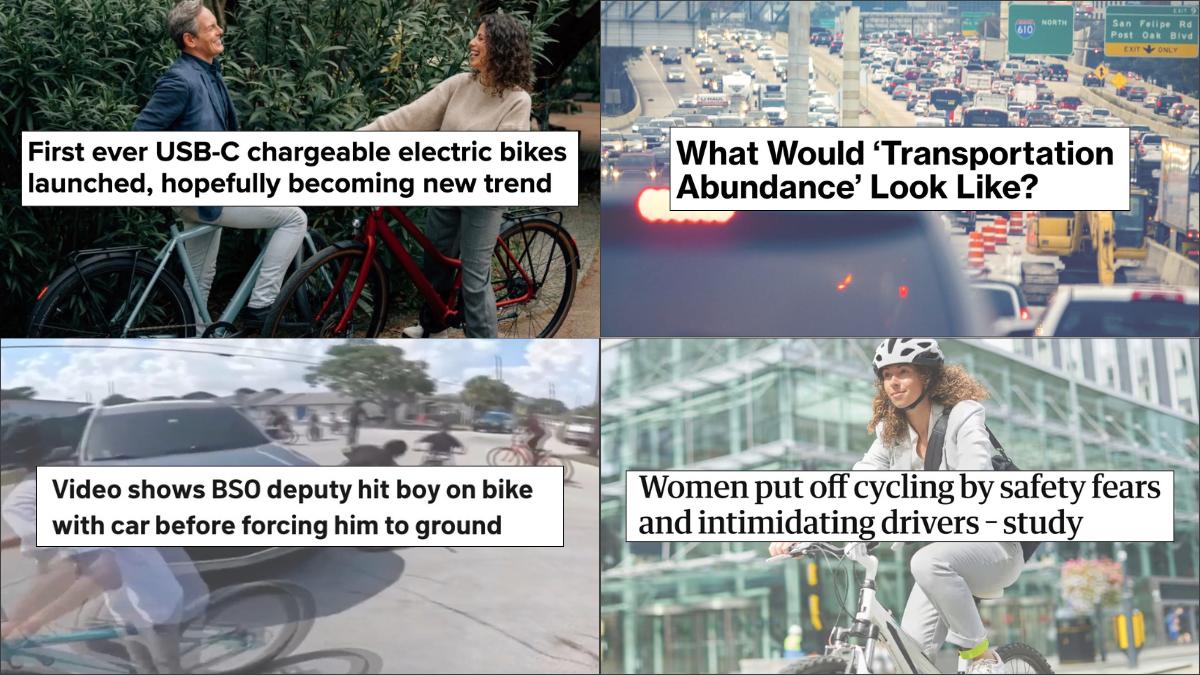
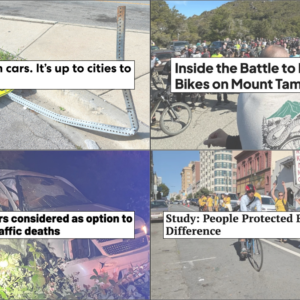
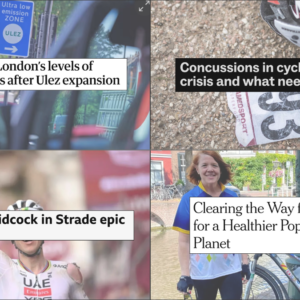
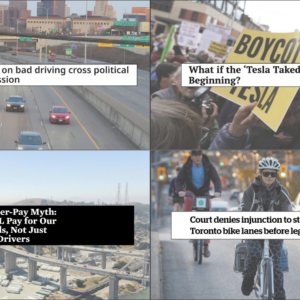
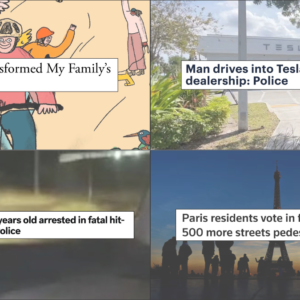
Thanks for reading.
BikePortland has served this community with independent community journalism since 2005. We rely on subscriptions from readers like you to survive. Your financial support is vital in keeping this valuable resource alive and well.
Please subscribe today to strengthen and expand our work.
Stunning Finish: That must be one massive brake in the headline – was disc or dual-pivot? Or was it a break?
haha David! Break. Fixed it.
Tern & tariffs: I wonder, are Democratic Party states more impacted by the new tariffs than Republican ones?
Texas is the biggest exporter which is why even Trump Cult members like Ted Cruz is
suddenly finding a backbone.
I read an article on this a little while ago and tried to find it in my history without any luck. But I remember the gist, which was a mix of, “it depends,” and “no one knows.” Not very helpful, but basically even first-order consequences are tricky to project; mostly that red and blue states would bear a similar overall burden, but because states have different budgets and infrastructure of their own, that burden would be distributed differently (affecting poor people more in red states, and middle/upper classes more in blue states—to be clear, in both cases the burden falls overwhelmingly on the poor, just slightly less so in blue states with their own more robust social safety nets but hosting industries and trade more likely to be affected).
The real point of the article, however, was that first-order consequences only tell a fraction of the story. No one can reasonably guess how long this trade war will last or how severe (and/or targeted) other countries’ retaliatory tariffs will be, so completely unpredictable secondary and tertiary effects will likely dwarf the semi-predictable first-order consequences anyway.
TL;DR: ¯\_(ツ)_/¯
I wouldn’t anticipate major differences at the state level, but maybe would anticipate some differences in degree of impacts between urban and rural areas since urban areas tend to be more integrated into the global economy than rural ones. There are more small to medium industries in LA that deal directly with importing goods from East Asia than in the entirety of Montana (presumably). That said, rural areas tend to be poorer and will feel the consumer price impacts from tariffs more acutely.
In a red state like Texas, where a significant amount of trade is in relation to Mexico and Latin America, there will be more significant impacts than in a blue state like Minnesota, where foreign trade is relatively less important.
Any rural folks who are involved in agriculture know well that their economic well-being is tied directly to trade policy, probably more so than most urban people.
That said, rural areas tend to be poorer and will feel the consumer price impacts from tariffs more acutely.
Some urban snobbery coming through?? Having less money is not the same as being poor as the standard is different in various areas than the constant consumerism of urban life (if the discussion is going to devolve into specious generalities).
Poor. lacking sufficient money to live at a standard considered comfortable or normal in a society:
Also, we should consider why the mindless export and import at a small and medium (or any) level is a good thing knowing the detriment to the world associated with transport and the morality of owning items constructed by prison camp or like conditions.
If you want to talk about morality of trade, you also need to consider how it benefitted the huge number of people in China (for example) that it allowed to escape desperate rural poverty. Or the people in rural Africa who now have electricity because they were able to import cheap solar panels that they never could have built locally.
I’m not equating anything with anything, but you’ve got to look at the whole picture. Like everything, good and bad are mixed together, and sometimes there are ways to get more of the good and less of the bad.
I understand from previous conversations that you believe the grid will survive and we will have enough electricity to provide for our current way of life and the use of even more electronics.
I simply disagree with that premise as I disagree with the lack of diversity of agriculture and manufacturing and the rise of specialization to the point where its seen as more efficient to ship things back and forth over oceans until at last a finished product is produced.
Looking at the whole picture is what makes it so nerve-racking seeing how fragile the supply chain is and how close to collapse it all is.
As far as Chinese morality, it is difficult to say. Is the government trying to create more consumers that they can then control absolutely once they are locked into a polluting factory life away from any ability to grow or raise their own food?
From my own experiences there, I seriously doubt the government is doing anything solely for the benefit of the people.
A case in point is oil production in North Dakota, the second largest producing state after Texas. ND oil is “light crude” and the US lacks capacity to refine it, so most of it is transported by rail (quite hazardous already as it easily explodes) through many states before it gets to various terminals to be transferred to oil tankers and shipped overseas to be refined, then shipped back as gasoline and other refined products. Meanwhile, the crude we can easily refine needs to be imported from Canada, Russia, Venezuela, and various other countries we don’t necessarily have good relations with.
I also agree that monocultures are bad. But I find it hard to believe that everyone can manufacture/grow everything themselves, even in a country as big and varied as the US. This is trebly true for smaller countries with fewer resources. I don’t think it is possible to dispute that at least some trade is beneficial.
As for what’s most “efficient”, well, that somewhat depends on what you’re measuring. Convert all those measurements into some common unit and compare.
I think it is very likely that trade hugely improved the Chinese standard of living. I do know that many Chinese people believe that to be true, and I don’t think they are all agents of the government. Subsistence farming is a very hard life.
Who on earth said that?!?
Re the Guardian article, I read a fantastic article in Citylab years ago about how cities generally would be constructed differently if (modern) women had been consulted, and it would have involved many more ramps, lighting, better transit service, covered walkways, and places to sit, among other things. There was a humanity and comfort to the infrastructure modeled that there isn’t in reality. Relatedly I tried the trick of taking the middle lane on 4th Ave downtown last week to get to the Flanders greenway. I actually got lucky and got behind a slow car so I didn’t feel like I was the one holding up traffic, but I missed the peace of a bike lane. I know some people on here are really passionate about vehicular cycling, and I applaud you and I think we shouldn’t have state laws that require bicyclists to remain in bike lanes at all times where they exist. It’s not for me! Give me a bike lane or a separate path.
So to bring the two points together, I’ll reference a third article that I read years ago. It was a columnist’s trip report from cycling in Amsterdam or Berlin complaining that he got stuck behind a woman on her bike in full business dress who appeared determined not to break a sweat on her trip (I hope she has an e-bike today!). Every cyclist deserves a spot in the bike lane, no matter how slow or fast they’re riding. If the bike lane had been an adequate size, the columnist could’ve passed her more easily. If bike lanes were designed by women, I have a feeling they would look a lot like what we saw in Lisa’s photos of Switzerland – and beyond. E-bikes are giving women (and others!) an easier path to regular bicycling in cities, but creating humane infrastructure for all of us to use is going to be vital in getting more of us onto bikes and keeping us on them as we age, have families, change jobs, and gain responsibilities. The truth is that infrastructure designed by and for women benefits everyone, and for cities to ignore that fact is to make them worse places for everyone.
“…if women had been consulted…” we’d have gotten better outcomes. So often when women are in office we judge them in ways that men are not, and when they run for office they’re asked questions that men aren’t expected to answer. Why exclude half the talent from politics?
When I ride in bike lanes, or out of them, it is repeatedly brought home that the designers mainly drive a car or a cursor, but hardly ever ride a bike. The natural flow of a bike is something that is only sporadically possible on our streets. It’s a kind of dance and it takes an aggressive style to match up with car traffic. Not everybody likes a mosh pit, and who wants that all the time?
The thing I liked about Critical Mass was the sense of moving freely with other people on a bike on the street. It was utopian in real time. I’m a little square in most parts of my life but I’m still pissed at Portland cops for just not getting it and putting the boot down.
Or…if ‘street designers’ rode a bike…then the [often] standard practice of bike lanes skipping intersections w/o accommodation … back when I started street design often the conversion with other designers this design gap was magical thinking: ‘cyclist, now you are a pedestrian, then now you are a vehicle’ …something I very rarely felt cycling through the Netherlands etc. over the last 30 years.
The USB-C charging is a fantastic idea. it certainly has the capacity to charge anything that can be considered a bike. I have two pedelec bikes at home, and they both have odd, propriety plugs that could break and be a massive annoyance. Let’s standardize.
DIY ebikes have been non-proprietary forever. However, I’m not aware of an off-the-shelf ebike battery charger that is designed for a USB-C 5V input (or USB-PD) instead of mains. That could be nice even if slower.
On “Overpolicing”:
1. As annoying as it must be to have *children* riding bicycles unsafely in the roadway, what the **** was the officer thinking? Did he really think running over a child would solve the problem?
2. I am NOT a fan of officers covering their faces with masks like this. These men are public servants! Are we not entitled to know their identity now? He’s not an undercover agent in Ukraine for crying out loud.
The video provided so little context it was hard to understand what was really going on. It looked like the cop was trying to do one of those PIT maneuvers on the bike, which just seems ridiculous.
(I’m ready for y’all to tell me I’m defending the cops or in love with Donald Trump or dumb or uninformed or pro status-quo or some other personal attack that avoids responding to the actual content of my post!)
you’re in love with cops and Donald Trump AND uninformed AND pro status-quo AND an enlightened “both sides are equally bad” bad faith centrist!
You left out “something something Elon Musk”. 😉
Yadda yadda Elon Musk?
Wow, auto correct really didn’t want me to yadda yadda anything.
You’re right about the police v. kids on bikes video except that ‘ridiculous’ is barely adequate. This is another red flag that we are doing it wrong.
Policing is dependent on motor vehicles to the degree that even bike cops operate merely as auxiliaries to cars.
Police officers meting out the danger they are hypothetically preventing, by choosing to crash cars into bike riders, is appalling. Destroying the village…
Figure out what procedure they are violating and put them at a desk with no overtime, boxes of pencils, and a dull knife.
I know you’ve rendered your judgement, but don’t you want to see the full context of the incident?
Did I miss something where Metro cited an abundance agenda to justify their vote of RQ? Confused about the connection to David’s piece.
I was drawing a line from the councilors who voted yes in part because they feel like it’s simply time to “get it built” and they wanted to show how our region can build things… sort of regardless of what the “thing” is, they didn’t want to stand in the way of getting something done. Maybe that has zero to do w the abundance agenda but it seemed to fit to me.
Thanks for clarifying Jonathan. I see it now, particularly in Councilor Lewis’s statement about “working on big things”. If she meant this to reference an Abundance agenda, I think that’s an unfortunate misappropriation of the concept. There is already a lot of misappropriation of causes going on with ODOT and Metro…
Anyway, I’d love to welcome more discussion on this topic – particularly in how Abundance both supports and challenges our existing mindset as bike advocates. The way I understand it, Abundance is not just about building stuff faster. It is about solving endemic challenges (like the cost of housing) through building. It is not just about building more, but also about changing what we are building. It is about changing the regulations, processes and incentives that keep us stuck in the status quo. The status quo is what favors building mcmansions over middle housing, and highways over sidewalks and transit.
This question seems particularly important for a city that prides itself on having stopped things (Mt Hood Freeway, CRC, Jordan Cove…). We have a lot of organizations that are build to slow things down, and a lot of political process that creates opportunities for that. I want to be clear that I cherish these aspects of Portland, and I also see a clear need for us to evolve. Pick your issue – housing, transportation, climate change… and I don’t see how we get where we need to be without some tools for selectively speeding things up and building them cheaper. I don’t know how we do that, but I do think it involves changing the conversation from *whether* to build to *what* to build.
The problem with the “abundance agenda” is that it requires stripping away the ability of the public to object to bad projects. So getting more powerlines through Forest Park (presumably an example of “good abundance”, assuming you don’t care about parks and the required clearcutting of mature forest the project will require) comes at the cost of getting more highway expansions and Zenith projects.
I really don’t know how you can separate the two.
But, ok.. if we’re not discussing whether to build the RQ project or the ginormous IBR, *what* should we build? Try to answer without sneaking in the *whether* to build question through the side door.
Most cities build roadway, sewer, and water capacity for an expectation that in 100 years your town of 5,000 will have a million people by then.
Contra Watts, I believe that it would be relatively easy to separate “good” and “bad” projects.
For instance, it is not necessary to subject infrastructure such as bike lanes and infill apartment buildings, or policies such Manhattan’s congestion pricing system and controlled burns to the same degree of legal scrutiny as infrastructure like highways and LNG terminals, or policies like strip mining, clear-cutting.
The idea that we should maintain a system in which these disparate activities are legally indistinguishable is insane! Lawmakers make such distinctions in law all the time.
And yet, though a creeping expansion of procedure and precedent, we have made the legal choice to treat these the same. Given the obvious consequences, there is no reason to continue doing so.
That would be insane, and we already don’t do that. Does PBOT really do an environmental impact statement when they stripe a bike lane? I’ve certainly never commented on one, but I have commented on many over the years for highways and clearcutting.
The “abundance agenda” isn’t about bike lanes, it’s about projects like powerlines through old growth forest areas, and trying to tilt the balance of power back in favor of development to where it was before the environmental reckoning of the1970s. If you do that for powerlines, you’ll probably get it for highway projects too.
It’s just a marketing term for making development even less democratic. It’s gross.
PBOT doesn’t make an EIS when it retries a bike lane, but that’s not what I claimed, is it, Watts?
I’m too busy to get you receipts for everything, Watts, but yes, it is possible to point out hundreds of examples of the kinds of projects I mentioned.
For instance, bike lanes were stymied for years by the California Environmental Quality Act:
https://www.latimes.com/politics/la-pol-sac-enviro-bike-lanes-20160407-story.html
Last point:
What kind of knowledge you do you have about the legislative process? You seem to believe that changing regulations to allow more renewable energy infrastructure necessitates a similar change or highway widening projects, as if these two things are somehow necessarily linked phenomenon.
Using your logic, I could argue that it’s not a good idea to increase auto registration fees because that would necessarily increase bicycle regulation fees. Similarly, one could argue that reasoning LA for more apartments would naturally lead to more oil drilling in the LA basin. Do you see how that logic is flawed?
You seem to have some idea that these different phenomena are inextricably linked in some way, and I’m really surprised, given how logical and literally your comments are. Do you have some evidence that this is actually true?
No, it is not. You claimed it would be insane if bike lanes were treated the same as clearcuts. And you are right. The fact they are not treated the same is beside the point — I fully agree it would be crazy if they were. I didn’t actually say the EIS for bike lanes were you words; I conjured that example as one example of how the process is not the same.
That California is insane — in may ways — is beside the point. For better or worse (likely a bit of both), our laws are different.
I mostly don’t understand the second part of your comment, so I’m not going to respond to that, except to say that once you start creating carve-outs for some things, it can be hard to resist adding more things. Which, in a roundabout way, is exactly why Trump has been able to create such mayhem with his tariff threats.
https://www.npr.org/2024/12/11/1218506684/worst-tariffs-ever-update